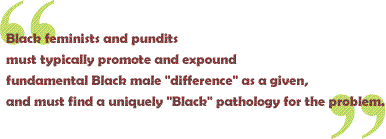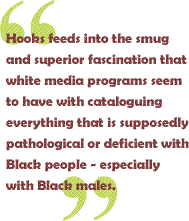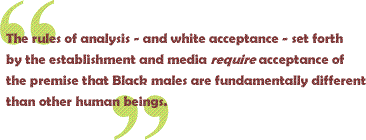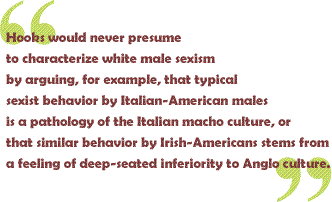
Let
me get this out of the way: is sexism present in every major
society and culture? Yes. But, Black male-bashing - especially
about violence and gender issues - is a perennial American
sport
that never seems to wane in popularity. We expect such anti-Black
male behavior as a matter of course from white media pundits
and some white feminist theoreticians. However, Black male-bashing
is especially disappointing when it comes from a notable person
in the Black community, one who claims to be concerned with
issues of Black self-esteem and Black "self-lovvve."
(I'm always suspicious about someone who blathers on about
"lovvve" all the time, like some pop psychology,
"New Age" 'therapy' placebo.) Unfortunately, as
listeners to Bell Hooks on the San Francisco, KQED-FM, public
radio show, "Forum," discovered on January
27, 2003, this Black feminist author falls into the category
of out-of-context Black male pathologizing. It seemed more
an exercise in Black cultural self-hatred.
Appearing
on the program along with acclaimed author, professor and
public lecturer Michael Eric Dyson, Hooks was ostensibly invited
to discuss her latest book, "Rock My Soul: Black People
and Self-Esteem." But her statements on the program (whether
or not they accurately reflect the content of her book) focused,
of course, on Black (especially male) psychopathology - not
on Black self-esteem. By doing so, Hooks feeds into the smug
and superior fascination that white media programs, such as
Michael Krasny's "Forum" show, seem to have with
cataloguing everything that is supposedly pathological or
deficient with Black people - especially with Black males.
 Hooks
even sniped at Dyson, asserting that his latest book containing
practical suggestions for improving the Black community, including
gender relations, is well beyond the intellectual capacity
of young Black men. Yet she claims that young working/underclass
Black males in the ghetto are all clamoring for her academic
books on feminist theory. Such Black underclass males are
now, no doubt, abandoning hip hop slang in favor of post-structuralist,
post-post-modernist, critical theory argot. I can just hear
the bloods now: "Indubitably, the narrative of our lives
is bound to descend into nihilistic miasmata vis-à-vis
a discursive self-actualization of our sublimated faculties."
Hooks
even sniped at Dyson, asserting that his latest book containing
practical suggestions for improving the Black community, including
gender relations, is well beyond the intellectual capacity
of young Black men. Yet she claims that young working/underclass
Black males in the ghetto are all clamoring for her academic
books on feminist theory. Such Black underclass males are
now, no doubt, abandoning hip hop slang in favor of post-structuralist,
post-post-modernist, critical theory argot. I can just hear
the bloods now: "Indubitably, the narrative of our lives
is bound to descend into nihilistic miasmata vis-à-vis
a discursive self-actualization of our sublimated faculties."
On
"Forum," the "pathology" Hooks concerned
herself with was what she purports to be a sheer "epidemic"
of Black male low self-esteem. This, host Michael Krasny posed,
could be evidenced by the so-called tendency of Black male
celebrities to become involved in relationships with white
trophy women. To judge by the tone of Hooks' response, a foreign
person unfamiliar with American society would imagine that
this at-best numerically occasional practice (concentrated
in - imagine that! - the status-conscious Hollywood and sports
milieu) is nearly ubiquitous. As if every red-blooded Black
male in the country is desperately running out to marry a
silicone-enhanced blonde. In truth, the attention given to
this subject during the program reflects more host Krasny's
or Hooks' distorted obsessions, rather than its true overall
significance in the national Black community. Additionally,
I assert that Black male physical abuse of even white trophy
wives - abuse emphasized by Hooks - are not events inherent
to Black males, but have everything to do with how men of
any color seeking trophy wives tend to regard them as property.
Even
more revealing than Hooks' inflation of the phenomenon into
a raging epidemic is her bizarre theory of the supposed cause
of such behavior: Black male sexual trauma, she  claims,
caused by suffering sexual abuse in childhood, which she asserts
is common within the Black community. Similar "trophy
wife" hunting on the part of white alpha males - the
winners get the tall, skinny, leggy blondes with the pouty
lips and the big breasts - is seen as a reflection of superficiality,
ego, and the generalized commodification of women endemic
in American society. Whereas, when the same behavior occurs
in Black males, it is attacked as an especially Black
pathological problem.
claims,
caused by suffering sexual abuse in childhood, which she asserts
is common within the Black community. Similar "trophy
wife" hunting on the part of white alpha males - the
winners get the tall, skinny, leggy blondes with the pouty
lips and the big breasts - is seen as a reflection of superficiality,
ego, and the generalized commodification of women endemic
in American society. Whereas, when the same behavior occurs
in Black males, it is attacked as an especially Black
pathological problem.
Hooks
fails to place certain sexist behavior on the part of a small
subset of Black males into context as a mere reflection of
the superficial gender standards and ills of American society
as a whole. This is precisely because the rules of analysis
- and white acceptance - set forth by the establishment and
media require acceptance of the premise that Black
males - albeit with "the good Black" provisional
exceptions - are fundamentally different than other human
beings. Under this analysis, Black males are, at root, not
only fundamentally different, but uniquely pathological, uniquely
predatory (especially sexually) and misogynist - in Hooks'
words, sexually immature, traumatized and dysfunctional. Those
white and Black feminists who at least implicitly accept this
general premise get rewarded. They are awarded, fêted
and, most importantly, regularly invited back to white highbrow
social and media forums. They are well paid for such service.
Some of them even get highly promoted, white-celebrated movies.
Therefore,
Black feminists who wish regular access to, and rewards from,
the white establishment cannot state the simple truth: that
many Black males absorb, to a greater or lesser degree, the
sexism and sexual standards of the dominant society. (In the
music industry, particularly when it comes to rap - the current
benchmark and 'font' of Black male pathology - such sexism
is often promoted or imposed by white corporate executives
over more socio-politically conscious songs.) Nor can such
Black feminists state - and be regularly invited back - that
any positive, viable and lasting corrective measures must
address sexism in the larger surrounding white society; that
the larger society, too, must change in how it considers and
values women. Rather, Black feminists and pundits typically
must promote and expound fundamental Black male "difference"
as a given, and must find a uniquely "Black" pathology
for the problem. Racist liberal white feminists can thus safely
use Black males as the whipping boy, via some Black feminist
surrogates. This helps such white feminists avoid any additional
backlash and further bad blood from the white men who control
media and social institutions, and on whom such white feminists
may ultimately depend for employment or personal and social
relationships. It lets white guys off the Hook.

Hooks'
assertion that Black male self-hatred based on widespread
childhood sexual abuse is the significant factor in any sexist
behavior, appears to be the price of entrance that Hooks must
pay for being given a regular, celebrated voice in white-controlled
media and publishing.
Hooks
would never presume to characterize white male sexism in the
same way, by arguing, for example, that typical sexist behavior
by Italian-American males is a pathology of the Italian macho
culture, or that similar behavior by Irish-Americans stems
from a feeling of deep-seated inferiority to Anglo culture,
let alone supposed rampant child sexual abuse among either
ethnicity. For reasons we all understand, she better not talk
about Jewish misogyny in Israel, as Jewish-American feminist
Andrea Dworkin has done. Nor would any mainstream broadcasting
or publishing outlet give Hooks a forum to assert such views.
Indeed, Hooks specifically implied that Jewish/Israeli society
(any society - except Black, I guess - that has suffered a
holocaust) is not sexist! But when it comes to Blacks,
"uniquely" pathological arguments are not only permitted,
but encouraged by a white institutional system of rewards,
and it is white liberals who often seem to love, suitably
couched, Black-bashing the most.
I
wonder if Hooks really does care about the well-being and
social health of the Black community, rather than just getting
fêted by whites. It is the responsibility of Black intellectuals
to resist these white encouragements toward the pundit sport
of Black pathologizing, not to give in to them. At least in
instances like these, Bell Hooks has gravely failed - and
to all our detriment.
Joseph
Anderson is a resident of Berkeley, CA, an occasional contributing
political columnist, a local media monitor and political
activist.


